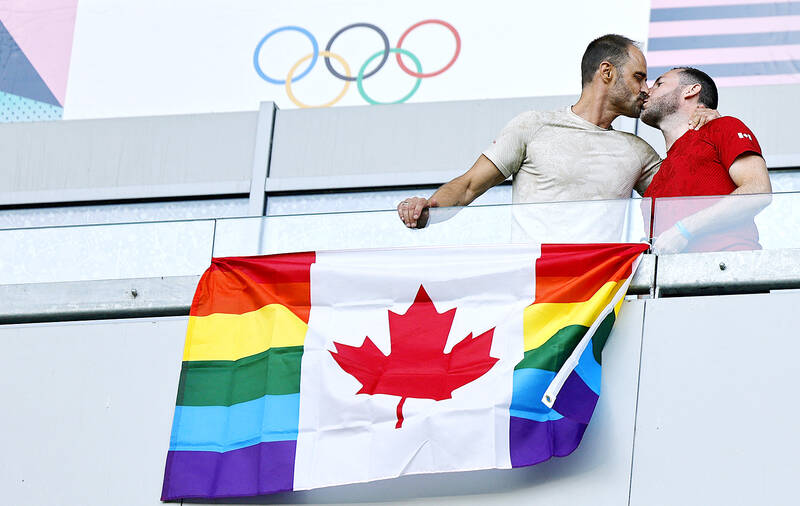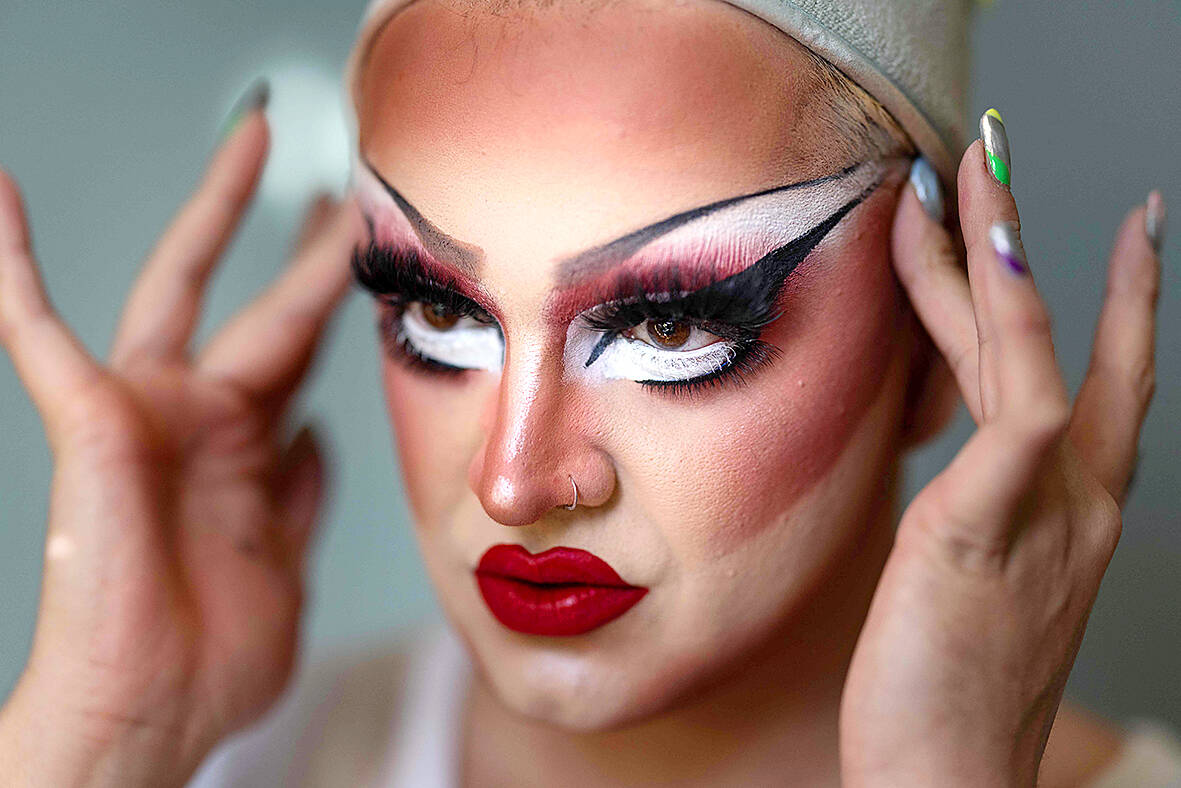On the shores of the River Seine, a fan zone dotted with rainbow-themed paraphernalia hopes to draw in the crowds to celebrate a record number of openly LGBTQ athletes at this year’s Olympics.
The event’s Pride House, which was first set up during the 2010 Vancouver Winter Olympics, opened on Monday in Paris.
“The idea is to welcome everybody,” said organizer Jeremy Goupille. “With a platform like the Olympics, we know we can change things.”

Photo: Reuters
The Summer Games this year include 193 openly LGBTQ athletes, up from 186 in the 2020 Games and 53 in 2016, specialized Web site Outsports says.
They include openly gay British diver Tom Daley, who on Monday won silver with partner Noah Williams in the 10m synchronized platform to give him a fifth medal in five Olympics. US basketball star and LGBTQ activist Brittney Griner is back on the court after spending a gruelling nine months in a Russian jail in 2022.
Her team won gold in the last two Olympics in Rio and Tokyo.

Photo: AFP
Brazilian judoka Rafaela Silva, who won a gold at the Rio Games in 2016, will also be competing.
‘WELCOMING SPACE’
Pride House has been a feature of most Games since Vancouver, excluding the Winter Games in Sochi, Russia in 2014.
Organizers hope the LGBTQ athletes in Paris will provide inspiration for members of the community worldwide.
At least 67 countries criminalize same-sex relations between consenting adults, Human Rights Watch says.
Violence and harassment against LGBTQ people in Europe have reached a “new high” in the past few years, the European Union’s rights agency says.
“Paris is the city of love, of all loves,” exclaimed deputy mayor Jean-Luc Romero-Michel at the opening on Monday night.
In the crowd, 23-year-old Lucas and 26-year-old Remy, neither of whom wished to share their surname, had painted their cheeks with a French flag and were excited.
“After the backlash of the right and the far right, it’s important to have a space that is welcoming, whatever a person’s gender or sexual orientation,” said Lucas, a student.
Australian skateboarder Poppy Starr Olsen said she was not competing this year after taking part in the Tokyo Games, but was there to cheer on the initiative.
“Skateboarding itself is really queer. So it’s been a super awesome place for me to grow up as a queer person,” the 24-year-old said.
“But you definitely experience hate sometimes, even if the people don’t mean it... It’s still there, which is why it’s really important to have a Pride House.”
‘WE ARE ALL EQUAL’
French Sports Minister Amelie Oudea-Castera said she too thought having the venue was key to “a message of inclusion”.
“It’s important for us to keep fighting against all types of discrimination,” she said.
“We are all equal and we all deserve to be respected,” she added.
She spoke after the Olympics opening ceremony on Friday sparked some controversy.
The sequence, a Greek mythology-inspired celebration including members of the LGBTQ community and a semi-naked singer painted in blue, had intended to promote diversity.
But Catholic groups and French bishops have accused it of being a disrespectful parody of the Last Supper between Jesus and his apostles.
US presidential candidate Donald Trump has called the segment “a disgrace.”
Turkey’s President Recep Tayyip Erdogan condemned the ceremony for “immorality against all Christians” and said he would report it to Pope Francis.
Oudea-Castera said the aim was not “to have any sort of provocation against any type of religion.”
“It was a message of inclusion, reconciliation and celebration of the Olympics god Dionysos,” who was father of Sequana, the goddess of the River Seine, she said.

April 14 to April 20 In March 1947, Sising Katadrepan urged the government to drop the “high mountain people” (高山族) designation for Indigenous Taiwanese and refer to them as “Taiwan people” (台灣族). He considered the term derogatory, arguing that it made them sound like animals. The Taiwan Provincial Government agreed to stop using the term, stating that Indigenous Taiwanese suffered all sorts of discrimination and oppression under the Japanese and were forced to live in the mountains as outsiders to society. Now, under the new regime, they would be seen as equals, thus they should be henceforth

Last week, the the National Immigration Agency (NIA) told the legislature that more than 10,000 naturalized Taiwanese citizens from the People’s Republic of China (PRC) risked having their citizenship revoked if they failed to provide proof that they had renounced their Chinese household registration within the next three months. Renunciation is required under the Act Governing Relations Between the People of the Taiwan Area and the Mainland Area (臺灣地區與大陸地區人民關係條例), as amended in 2004, though it was only a legal requirement after 2000. Prior to that, it had been only an administrative requirement since the Nationality Act (國籍法) was established in

With over 80 works on display, this is Louise Bourgeois’ first solo show in Taiwan. Visitors are invited to traverse her world of love and hate, vengeance and acceptance, trauma and reconciliation. Dominating the entrance, the nine-foot-tall Crouching Spider (2003) greets visitors. The creature looms behind the glass facade, symbolic protector and gatekeeper to the intimate journey ahead. Bourgeois, best known for her giant spider sculptures, is one of the most influential artist of the twentieth century. Blending vulnerability and defiance through themes of sexuality, trauma and identity, her work reshaped the landscape of contemporary art with fearless honesty. “People are influenced by

Three big changes have transformed the landscape of Taiwan’s local patronage factions: Increasing Democratic Progressive Party (DPP) involvement, rising new factions and the Chinese Nationalist Party’s (KMT) significantly weakened control. GREEN FACTIONS It is said that “south of the Zhuoshui River (濁水溪), there is no blue-green divide,” meaning that from Yunlin County south there is no difference between KMT and DPP politicians. This is not always true, but there is more than a grain of truth to it. Traditionally, DPP factions are viewed as national entities, with their primary function to secure plum positions in the party and government. This is not unusual